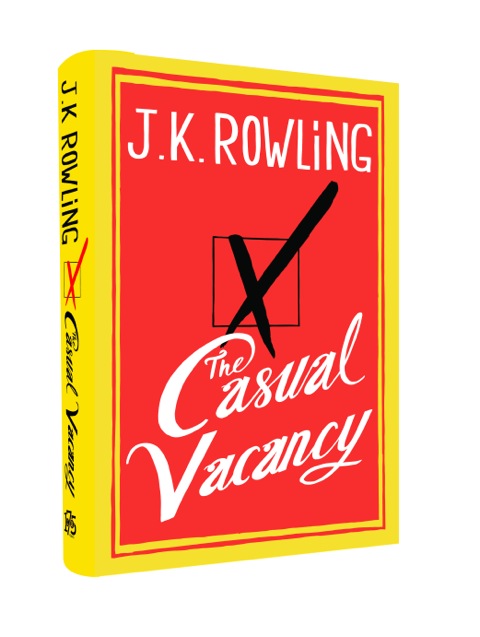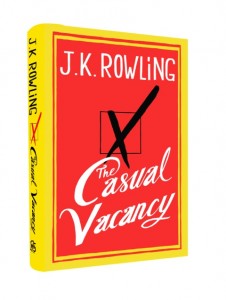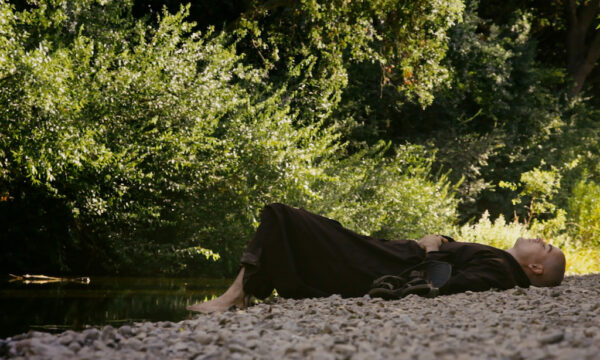The Casual Vacancy by JK Rowling

Rowling’s first foray into adult literature has received mixed reviews; some praising her bold exploration of a society ruled by class, while others criticising a brash attempt at realism, covering subjects such as promiscuity, prostitution, rape, drug addiction, child abuse and death. The Casual Vacancy can therefore be seen as adult in every sense of the word. By breaking away from her famous Harry Potter children’s books (although widely read by adults too) and purposely writing explicit adult content, this novel will never be re-published with children’s covers.
 Centering on the small provincial town of Pagford, The Casual Vacancy follows residents in turmoil, upset by the unexpected death of Barry Fairbrother, a local councillor equally admired and reviled for his political stance and favour towards social causes of which his opponents find controversial.
Centering on the small provincial town of Pagford, The Casual Vacancy follows residents in turmoil, upset by the unexpected death of Barry Fairbrother, a local councillor equally admired and reviled for his political stance and favour towards social causes of which his opponents find controversial.
Using the village sized population as a microcosm for the world at large, the cast represent every imaginable facet of society. Old and young, upper, middle and lower class, the rich and desperately poor all feature in different combinations.
The strength of this novel is the delicately handled descriptions of everyday life. The differing dynamics of family life are exposed and contrasted against each other with devastating effect. Teenagers loathing their parents, a family cowering under an abusive husband and father, and a broken family in harrowing circumstances visited regularly by social workers mix with a wealthy family with an impressive lineage (whose Christmas party invitations are coveted) and socially ambitious couples whose pretension and vulgarity is blindingly obvious to everyone but themselves. Rowling’s ability to handle a large cast, creating convincing characters with detailed back-stories hails from her Potter days, creating depth to a character’s personality and effectively engaging a reader’s attention.
The structure of the novel allows for these characters of wildly differing circumstances to effortlessly interact with each other, almost uniformly playing out lonely and hollow friendships and affairs, suggesting that a look underneath the attractive veneer of a picturesque village lays the worst of human nature.
This however, leads to the main failing of Rowling’s latest novel. While it is admirable that the author, internationally famous for her PG-friendly and charming take on good triumphing over evil, tackles difficult subjects, often with unguarded moral motive behind them; the overwhelming tragedy and extreme disturbing nature of the later plot points can come across as overblown and melodramatic.
The novel’s conclusion also raises more questions surrounding the author’s aims. The introduction of characters works well, each with depth and individuality and there is the initial exposé of the lives of the more respectable residents of Pagford. However, the finale provokes questions as to whether the author feels there are those that are beyond help as the narrative seems to suggest, or whether social welfare will benefit those in need, as many of the more deliberately likable and admired characters in the novel believe, including the much loved and early deceased councillor.
Overall, Rowling’s literary effort is good. Her skilful storytelling and characterization is undeniable, hooking a reader until the last page. But similar to the plot, scratching below the surface reveals some unsavoury truths, leaving readers handling the incongruities in the moral messages left by Rowling on the nature of her main themes: social welfare and responsibility, poverty and politics.
The editorial unit
The Casual Vacancy is published by Little Brown Book Group at the hardback price of £20. For further information visit the Little Brown official website here.
























Facebook
Twitter
Instagram
YouTube
RSS